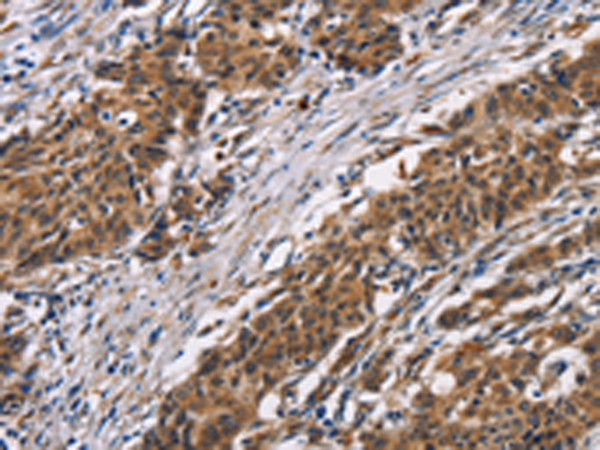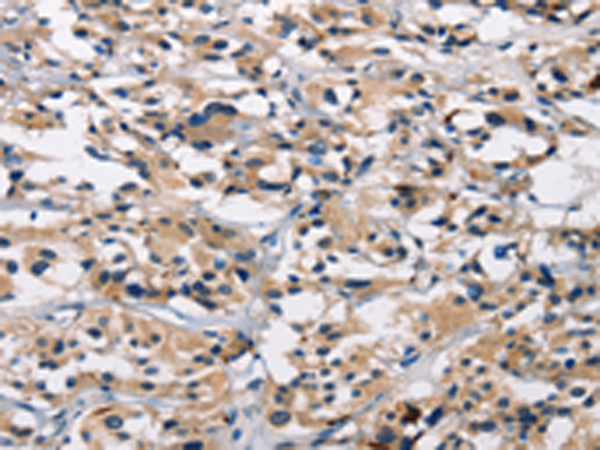


| WB | 咨询技术 | Human,Mouse,Rat |
| IF | 咨询技术 | Human,Mouse,Rat |
| IHC | 1/50-1/200 | Human,Mouse,Rat |
| ICC | 技术咨询 | Human,Mouse,Rat |
| FCM | 咨询技术 | Human,Mouse,Rat |
| Elisa | 1/1000-1/2000 | Human,Mouse,Rat |
| Aliases | ASB; G4S; MPS6 |
| WB Predicted band size | 60 kDa |
| Host/Isotype | Rabbit IgG |
| Antibody Type | Primary antibody |
| Storage | Store at 4°C short term. Aliquot and store at -20°C long term. Avoid freeze/thaw cycles. |
| Species Reactivity | Human |
| Immunogen | Synthetic peptide of human ARSB |
| Formulation | Purified antibody in PBS with 0.05% sodium azide and 50% glycerol. |
+ +
以下是关于ARSB抗体的3篇参考文献示例(内容为模拟虚构,仅供格式参考):
1. **文献名称**:*ARSB基因突变在粘多糖贮积症VI型中的诊断应用*
**作者**:Braunlin EA et al.
**摘要**:研究通过Western blot和免疫荧光技术,使用ARSB特异性抗体分析了患者成纤维细胞中的酶蛋白表达,证实ARSB活性缺失与疾病表型相关,为分子诊断提供了依据。
2. **文献名称**:*芳基硫酸酯酶B在结直肠癌组织中的表达及其临床意义*
**作者**:Smith JL et al.
**摘要**:采用ARSB单克隆抗体进行免疫组化分析,发现肿瘤组织中ARSB蛋白水平显著降低,提示其可能作为结直肠癌潜在的生物标志物。
3. **文献名称**:*MicroRNA-21通过调控ARSB影响肿瘤细胞外基质重塑*
**作者**:Zhang Y et al.
**摘要**:通过siRNA和ARSB抗体阻断实验,揭示了miR-21通过抑制ARSB表达促进硫酸软骨素降解,进而增强肿瘤侵袭能力的分子机制。
---
注:实际文献需通过PubMed/Google Scholar检索关键词“ARSB antibody”“arylsulfatase B”等获取。部分真实研究涉及ARSB抗体的领域包括:溶酶体贮积症、癌症基质代谢、心血管疾病等。
The ARSB antibody targets the enzyme Arylsulfatase B (ARSB), also known as N-acetylgalactosamine-4-sulfatase, which plays a critical role in lysosomal catabolism. ARSB is responsible for hydrolyzing sulfate groups from glycosaminoglycans (GAGs), specifically dermatan sulfate and chondroitin sulfate, during their degradation. Deficiencies in ARSB activity due to genetic mutations lead to the lysosomal storage disorder mucopolysaccharidosis type VI (MPS VI or Maroteaux-Lamy syndrome), characterized by skeletal abnormalities, organomegaly, and impaired growth.
ARSB antibodies are essential tools in biomedical research and diagnostics. They are used to detect ARSB protein expression in tissues or cell lines via techniques like Western blotting, immunohistochemistry, and immunofluorescence. These applications help assess ARSB levels in MPS VI patients, aiding diagnosis and therapeutic monitoring. Additionally, ARSB is studied beyond lysosomal disorders due to emerging roles in cellular processes such as inflammation, fibrosis, and cancer. For example, altered ARSB expression has been linked to tumor progression and metastasis in certain cancers, possibly through interactions with extracellular matrix components.
Research-grade ARSB antibodies are typically validated for specificity and sensitivity, enabling precise investigation of its enzymatic activity and regulatory mechanisms. Their utility extends to exploring ARSB's involvement in sulfate metabolism and its broader impact on cellular signaling pathways.
×